




The first principle of the NHS Constitution sets a clear standard: a comprehensive service, available to all It’s a value we all uphold but how well is it being realised, particularly for children in care?
Recent reviews suggest we still have work to do. In December, the Child Safeguarding Practice Review Panel highlighted equality-related concerns and intersectional vulnerabilities, especially among those facing multiple forms of discrimination.
Then, in March, a report examining 53 cases involving children from Black, Asian and Mixed Heritage backgrounds exposed a concerning lack of attention to race, silence on racism, and missed opportunities to address bias.
It’s from this reality that today’s conference takes shape.
Throughout the day, we’ll explore how personal values influence professional decision-making and how individual self-awareness can be harnessed to create more equitable practice. We'll look at how identity, intersectionality and lived experience shape the care journey and how services can better reflect and respond to those realities.
You’ll hear current research on the disparity between care-experienced young people’s lived experiences of disability and the way these are captured in data. Most importantly, you’ll hear directly from those with lived experience.
Our rapid-fire “blitz” presentations will showcase innovative, effective practices from across the UK — highlighting holistic and child-centred approaches to neurodevelopmental health care, as well as initiatives that improve access to health care for unaccompanied asylumseeking children.
While a single day isn’t long enough to cover every protected characteristic outlined in the NHS Constitution, we hope today offers space to learn, reflect and connect
We invite you to engage with the ideas shared, challenge assumptions, and take practical insights back into your everyday work
Thank you for being here and for your ongoing commitment to children in care.
References
“It’s Silent”: Race, racism and safeguarding children, March 2025, CSPRP
Annual Report 2023 to 2024: Patterns in practice, key messages, and 2024 to 2025 work programme December 2024, CSPRP

9.30am Registration
10am
10.05am
Welcome | Michelle Bell, Head of Member Services and Engagement, and Interim Managing Director, CoramBAAF
Morning introduction from Co-Chair Dr Michelle Bond | Named Doctor for Children in Care, Brighton and Hove, and Vice-chair of CoramBAAF Health Advisory Committee
10 10am Keynote address
Dr Arlene P Weekes, Author, Anti-Black Racism Activist, Social Work Management Consultant and Trainer, PGCHE SFHEA
Presentation: Disability, Disparity and Demand
10.35am
The numbers and experiences of children in care and care leavers with a disability or long-term condition | Dr Claire Baker & Susan Lake
11.20 am Break
11.50am Blitz presentations
12.30pm Workshops Round one
1.15pm Lunch
2.15pm Workshops Round two
3.00pm Comfort break
3.15pm
3.20pm
Afternoon introduction by Co-Chair Cathy Jermey | Designated Nurse for Children in Care and Care Leavers, NHS Devon Integrated Care Board
Panel discussion: ‘A comprehensive service, available to all’ What makes for equitable and accessible health care? | Anthony Lynch, Susan Lake and members of the Drive Forward Policy Forum, Salma and Ikra
4pm Networking
We encourage you to stay in the main room or refreshments area for a chance to network with today’s speakers and delegates.
4.30pm Close

The CoramBAAF Health Group provides our members with a forum to improve standards of practice for health professionals working in adoption, fostering, kinship and child care practice. It facilitates interdisciplinary understanding of health matters and the exchange of information and gives members a voice on regional and UK-wide issues to help influence policy and practice.
Receive our quarterly newsletter with news, updates, recommended training, etc, relevant to health practitioners
Join our free Health Practice Conversation sessions.
Be the first to hear about relevant training opportunities, webinars, etc.
Access our briefing notes, position statements, reports, publications and research.
Apply to join the Health Advisory Committee when vacancies arise.
Read the minutes from the quarterly Health Advisory Committee meetings.
These are all in addition to your CoramBAAF membership benefits.
corambaaf.org.uk/networking
Group membership is free and open to: individual members who are working as a health practitioner medical advisers to member agencies specialist, named or designated nurses/doctors for looked after children and young people of member agencies health visitors and school nurses working with looked after children and young people of member agencies
physicians, nurses and professionals who are employed by a corporate member and have a special interest in the health aspects of adoption, fostering and looked after children trainee paediatricians who are undertaking medical advisory roles in adoption or fostering.

The first principle of the NHS constitution is that it is available to all irrespective of gender, race, disability, age, sexual orientation, religion, belief, gender reassignment, pregnancy and maternity or marital or civil partnership status. The service is designed to improve, prevent, diagnose and treat both physical and mental health problems with equal regard. It has a duty to each and every individual that it serves and must respect their human rights.
At the same time, it has a wider social duty to promote equality through the services it provides and to pay particular attention to groups or sections of society where improvements in health and life expectancy are not keeping pace with the rest of the population.
Participants will be able to apply an EDI lens to their own area of practice and health services for children in care. This includes ensuring health services are accessible, engaging and responsive to individual needs

Enable health professionals to reflect on their understanding of identity, complex identities and intersectionality
Attendees can describe how personal characteristics such as race, nationality, ethnicity, disability, gender and sexual orientation may impact health, experience of health care and care experience.
Grab your free copy at our
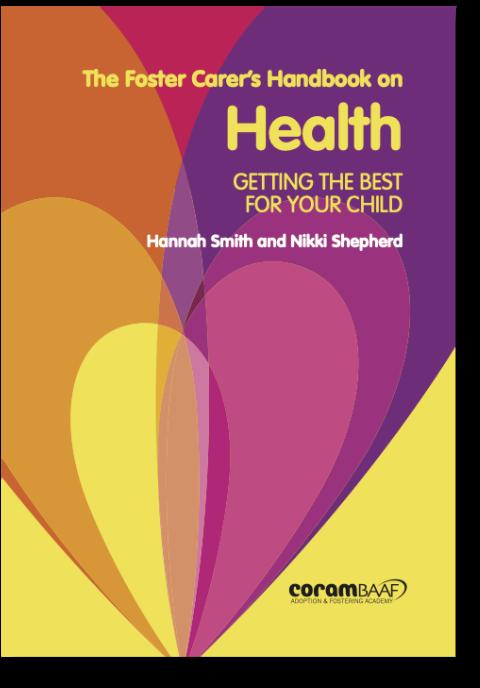
Authors
Hannah Smith and Nikki Shepherd
Health care is important for all children and young people, and for their parents or carers
But fostered children can experience extra health challenges. Children frequently enter the care system with a worse level of health than others, in part due to the impact of early abuse or neglect. Evidence suggests that they often experience common health risks to a higher degree than their peers. They may also have higher rates of disabilities or mental health needs.
Foster carers have a vital role in supporting the health of the children in your care But how best can you do this? What do you need to know about fostered children’s specific health needs, and how to manage them? How can you help children to understand their own health, and encourage them to live healthier lives, now and in the future?

This handbook will support you to navigate through the health service, to ensure that children’s needs are met, and to be a role model for their health choices. It also provides advice on self-care, to help you ensure that you safeguard your own health in this demanding role.
Growing up in care with multiple disabilities, Susan faced significant challenges, including a lack of proper support and understanding from the care system. Despite these obstacles, a late autism diagnosis at 21 enabled her to pursue higher education and advocate for systemic changes to better support children with disabilities in care.
Growing up in care with multiple disabilities was extremely challenging. I did not speak or smile aged two, and was described as “depressed” by my family social worker. At four, another social worker queried whether I might have autism, but it was claimed ‘girls don’t have that’ When I was 11, my older brother was diagnosed with autism, and when I read the paperwork, it summed me up; I knew then that I was autistic. I also have a condition called Ehlers-Danlos Syndrome which causes mobility issues and something as simple as picking up my school bag could lead to a dislocated shoulder and land me in A&E.
At 12, I suffered a traumatic brain injury. I fell off a friend’s shoulders, breaking my skull, and cerebellar ataxia followed. Whilst I re-learnt to walk with crutches for a short period, I am now a full-time wheelchair user with a visual impairment. I went into care at 14. I was always going to be vulnerable due to my brain injury, but this was not always taken seriously by the professionals at my residential care home To “help” me recover from my fear of sitting on other people’s shoulders, one of the staff sat me on his shoulders in a local park. I fell backwards and hit my head in a different area from my previous break.
While in the residential care home I was diagnosed with mixed anxiety and depressive disorder, anorexia, and complex post-traumatic stress disorder, but I was never supported to understand what my needs were and how they might impact my life I finally asked to be assessed for autism It had been picked up by multiple professionals, including the manager of the children’s home and some teachers at the new school. However, CAMHS refused to assess me. They said that because I was in care, I could be moved at any point whilst on the waiting list and couldn’t guarantee I would still be living in the same area. CAMHS said I would have to wait until I was 18 to be put on the adult waiting list. My social worker should have fought for me at that point, but nothing happened.
At 16, I broke down. I had an anorexia relapse, and I was having daily “episodes”, which I now know to be autistic meltdowns. The residential home placed me on a behaviour plan, which stated that if I had more than two “episodes” a week, I failed If I had more than four failures in three months, I would lose my place at the residential home. Well, I lost my place. I felt that the care system couldn’t handle my disabilities.
I was then moved to a homeless YMCA hostel that also failed to manage my disabilities I needed to use the lift, but it was only in operation after 8am when I needed to leave the hostel at 7:30am to get to school on time. As a consequence, I was late for school every day and I was kicked out of the hostel within 26 days. Without support, I went on to fail all but two of my GCSEs and all my A Levels.
I finally received a late diagnosis of autism at the age of 21 and went on to do an access to higher education course to get into university to study International Relations Thanks to the diagnosis, I now receive specialist support from an autism-trained mentor twice a week which helps me stay on track with my studies.
Sadly, my story as a young person with disabilities, struggling to access diagnosis and support in the care system, is far from unique. A new report by Coram Voice, featuring an analysis of the numbers and experiences of children in care and care leavers with a disability or long-term health condition found that many may be missing out on vital support. Data obtained under a Freedom of Information (FOI) request to all 153 local authorities (LAs) found that 13% of care leavers had recorded disabilities. In contrast, 27% of care leavers self-report having a disability or long-term health condition. The disparity between these figures suggests that a significant number of children and young people are not having their needs met. The percentage of young
people self-reporting a disability or longterm health condition is also rising over time, from 22% in 2017 up to 32% in 2023
The research also found inconsistencies in how disability is definedacross LAs, with significant variation in the percentage of children in care who were recorded as having a disability in an LA, ranging from 3% in the lowest proportion to 32% in the highest. The difference was even more pronounced in care leavers, with 1% vs 36%.
Some practitioners who shared their perspectives as part of the research noted that some disabilities, such as autism, are“invisible”and reported feeling less confident in their understanding of neurodiversity. They noted that support for disability tends to focus on physical health or learning impairments where the need for ongoing support or adaptations can appear more obvious. Young people reported that they need their workers to be curious about disability and to have conversations with them to hear their views and experiences. The failure to have open discussions with young people can lead to them not knowing enough about their condition and needs.
According to existing research, children with disabilities are more likely to be looked after than children without disabilities. They are also at an increased risk of harm and abuse than non-disabled children and experience multiple moves or inappropriate placements. Coram Voice’s Bright Spots Programme research also found that care leavers with
disabilities scored lower across a range of wellbeing measures. This is something I can relate to, as it is much harder to seek employment opportunities, make friends and have positive mental health when you have a disability.
“Disability comes with a whole host of financial struggles for care experienced young people due to reduced working opportunities. This is compounded by the complexity of the welfare system, as well as higher utility bills, and extra costs due to specialist diets and equipment.”
Given the risks and poorer outcomes for children with disabilities, the failure to keep adequate records of disability is shocking. Ultimately, LAs do not know how many of the children in their care and their care leavers have disabilities, making it impossible to offer the right resources The data obtained by Coram Voice represents the first national snapshot of disabilities recorded by professionals among children and young people in the care system and the disparity with self-reported disabilities should be a huge wake-up call
I would like to see dedicated neurodiver workers embedded in looked after child teams, along with speech and language therapists who can diagnose autism, AD PTSD, and other common disabilities So workers need up-to-date disability data ensure that they can support their youn people effectively. But they should also encourage open conversations with you
people, welcoming their questions and tackling stigma. For this to happen, it is essential that professionals themselves are supported by their LAs to gain the skills and knowledge of disabilities and long-term health conditions. I also think all children coming into care who have suspected disabilities or additional needs should be fast-tracked through CAMHS to ensure they don’t fall through the gaps like I did.
I struggled as a child in care with disabilities, but after receiving the diagnosis I needed and the necessary support, I excelled in higher education and am now applying to study for a PhD. Now is the time to ensure the next generation of looked after children and care leavers are given the right support to reach their potential.
Susan Lake, postgraduate student in International Relations, Care Leaver and Volunteer with Coram Voice
Written for the CoramBAAF website. Originally published November 2024.





During the run-up to this conference, the Child Safeguarding Practice Review Panel published a report that is highly relevant to our theme: “It’s Silent”: Race, racism and safeguarding children, March, 2025.
The report sought to understand the specific safeguarding needs of children from these specific ethnic backgrounds and how agencies helped to protect them before it was too late. The key findings include:
Limited attention to race and ethnicity
The analysis reveals a concerning lack of focus on race, ethnicity and culture in both safeguarding practice and reviews. This oversight has resulted in insufficient critical analysis and reflection on how racial bias impacts decision-making and service offers to children.
The report identifies a pervasive silence and hesitancy to address racism and its manifestations. This silence renders the safeguarding needs of Black, Asian and Mixed Heritage children invisible, both in practice and in the system for learning from reviews.

In failing to acknowledge race, racial bias and racism, the current system misses many opportunities to learn from incidents where Black, Asian and Mixed Heritage children have been seriously harmed or died. This failure to see the totality of children’s lives or to scrutinise how racial bias may have affected decisionmaking leaves children vulnerable and at risk of harm, without the necessary support and protection.

‘This report highlights that some progress has been made in understanding how race, ethnicity and culture can inform practice responses to children and families. However, our analysis reveals too few examples of these issues being considered in any depth or specificity. This indicates that there is a need to surface and challenge why there is such systemic silence and reticence in addressing and confronting these issues. It is clear too that more work is urgently needed so that safeguarding leaders and practitioners consistently consider, understand and take account of children’s identity and heritage.’
‘An intersectional approach can foster richer curiosity and understanding both of individual children’s lives and of safeguarding practice responses by taking account of how social identities related to race and racism, gender, poverty and class overlap and are woven together. It can help professionals better comprehend, consider and be more vigilant in their work with Black, Asian and Mixed Heritage children and families affected by different forms of oppression, discrimination and disadvantage.’
‘Individual practitioners and leaders will be on their own individual journey of understanding and acting in relation to race, racism and racial bias. Everyone will have their own experiences of making sense and addressing these issues; this may affect their confidence in identifying and confronting matters relating to race, racism and racial bias. We all have a professional responsibility to take ownership of developing our own confidence and capacity to address these important issues effectively. We will also need good support and challenge from our teams and leaders so that these issues are explored together and within environments where critical discussions are welcomed and normalised.’
We are delighted to welcome Dr Michelle Bond and Cathy Jermey as our Chairs who will be sharing key insights and expertise from their respective fields throughout the day.

Designated Nurse and Improvement Lead for Children in Care and Care Leavers
Michelle has been working as a consultant Community Paediatrician since 2007 and has had an interest in the health of children in care since she was a trainee.
She is currently working in Brighton and Hove as a Named Doctor for children in care and Medical adviser for adoption and fostering
In addition, Michelle leads the FASD assessment pathway in the Child Development Centre in Brighton & Hove She also a Clinical Lead for the Royal College of Pediactrics and Child Health ‘How to Manage: FASD in Community Paediatric Services’ course.
Michelle has been attending meetings at CoramBAAF since the start of her Consultant career and is currently Vice Chair of the Heath Group Advisory Committee.
Named Doctor for Children in Care, Brighton and Hove, and Vice-chair of CoramBAAF Health Advisory Committee

Cathy is one of the Designated Nurses within NHS Devon and has worked with Children and Young People in Care and Care Leavers for over 19 years.
Cathy’s main interest is participation work, listening to the voice of children and young people and ensuring that they are involved in service development and delivery, to meet the specific needs of our cared for population
Her other focus areas include the health of Unaccompanied Young People (UASC), the health and development of the Under 5s including speech and language, public health and the health of Care Leavers.
Cathy is a member of the CoramBAAF Health Advisory Committee.


Author, Anti-Black Racism Activist, Social Work Management Consultant and Trainer, PGCHE SFHEA
10.10am - 10.35am | Main room
We are delighted to welcome Dr Arlene P Weekes to deliver our keynote address at this year ’ s Annual Health Conference. Arlene has over 30 years ’ experience working in the children and families sector. Her work examines the distinction between conscious judgement, bias and prejudice, highlighting the complexities involved in managing diverse perspectives and biases She is going to be speaking to us about the importance of reflecting on our understanding of identity, complex identities and intersectionality as well as how these personal characteristics may impact health, experience of health care and care experience.
With over 30 years in social work, Arlene has held a variety of roles, including Probation Officer, Leaving Care Team Manager, Child Protection Chair, Fostering and Adoption Panel Chair, and IRO for foster carers and children. Currently, she balances her time as a freelance trainer, Service Manager and Senior Lecturer at the University of West London. Arlene holds a PhD in social work, a Diploma in Management Studies, and a Practice Teacher Award. Her PhD research, completed in 2021, examined how personal biographies, attitudes and values influence decision-making in social work. Building on this, she developed the Effective Personal and Professional Judgement (EPPJ) model, which helps individuals improve decisionmaking by understanding both internal and external influences.
EPPJ | Increased Personal Awareness Increases Professional Effectiveness
What’s race got to do with it? BASW
Effective Personal and Professional Judgement in Social Work
Care experienced children and young people need their workers to be curious about disability and to have conversations with them to hear their views and experiences. In this presentation, we will be exploring what we do, and importantly, do not know about children in and leaving care with a disability or long-term health condition in England.
Led by Dr Claire Baker, Coram Voice, this presentation will look at some of the findings from the recentDisability, Disparity and Demandproject. It brings together results from a Freedom of Information request to local authorities, learnings from the Bright Spot Programme on disability, and workshops conducted with young people and leaving care professionals. Claire will also be joined by Susan Lake, who volunteers with Coram Voice and contributed to this project.
Dr Clare Baker Senior Practice Adviser, Coram Voice

25 years, Dr Claire er has specialised search focusing he experiences outcomes for ng people in and ng care.
Relevant resources
She works as an independent researcher. She also supports the Bright Spots programme at Coram Voice. Bright Spots Programme - Coram Voice
Susan Lake
Postgraduate student in International Relations, care leaver and volunteer with Coram Voice
Susan is currently a post-graduate student studying international relations and a volunteer with Coram Voice. As a disabled woman and care leaver, she is passionate about improving the experiences of children in care and care leavers with disabilities.
The door is still closed reportCoram Voice
Disability, disparity and demandCoram Voice
This unique and bestselling series provides expert knowledge about a range of children’s conditions and issues, coupled with facts, figures and guidance presented in a straighforward and accessible style.
In each book, adopters and foster carers also describe what it is like to parent an affected child, “telling it like it is”, sharing parenting experiences and offering useful advice to anyone working with or thinking of looking after a child with one of these conditions
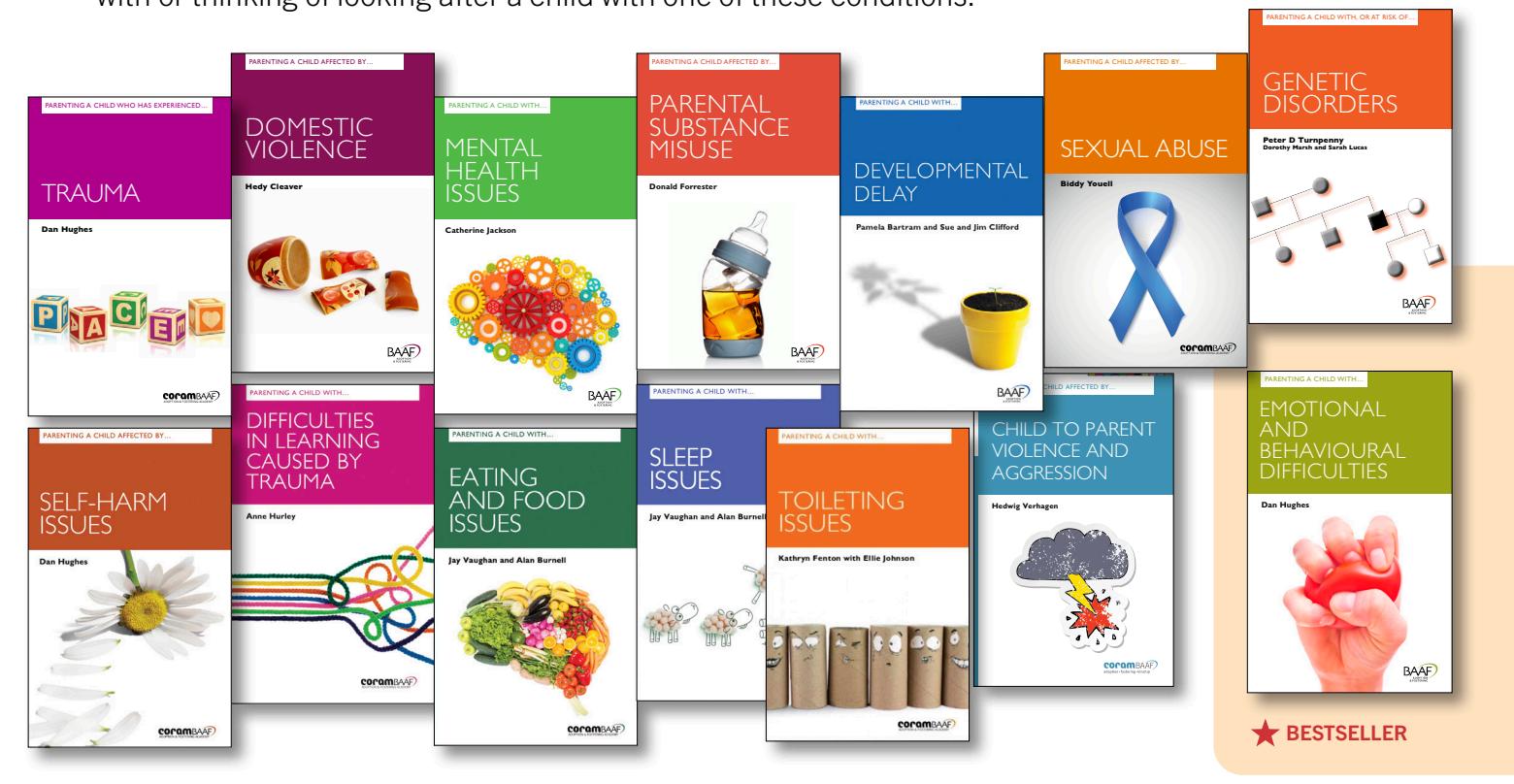


Blitz presentations, also known as lightning talks or data blitzes, are short, high energy sessions that offer a quick and engaging way to share research, ideas or projects They provide a great opportunity to showcase a variety of work in a fast-paced format, helping to spark interest, inspire discussion and highlight the breadth of innovation happening across the field.
We share our experience of providing holistic, high-quality neurodevelopmental diagnostic assessments for care experienced children and young people. Working across institutional boundaries, we describe one way of achieving a favourable solution to providing this muchneeded service; placing the needs and ambitions ofour children and young people central to scope and delivery.

Consultant Community Paediatrician, NHS South East London
Dr John-Legere is a Consultant Community Paediatrician and Designated Doctor. She understands the varying commissioning landscape of services for looked after children, not only in terms
of completing health assessments, but also in terms of their wider access to health services. Dr John-Legere possesses clinical skills in neurodevelopment, safeguarding and understanding of the impact of trauma on development. She has particular expertise in health issues related to adolescents and unaccompanied minors In addition to her NHS work, Dr John-Legere is one of the founding directors of the Neurodiversity Foundation - a non-profit organisation registered in Trinidad & Tobago.
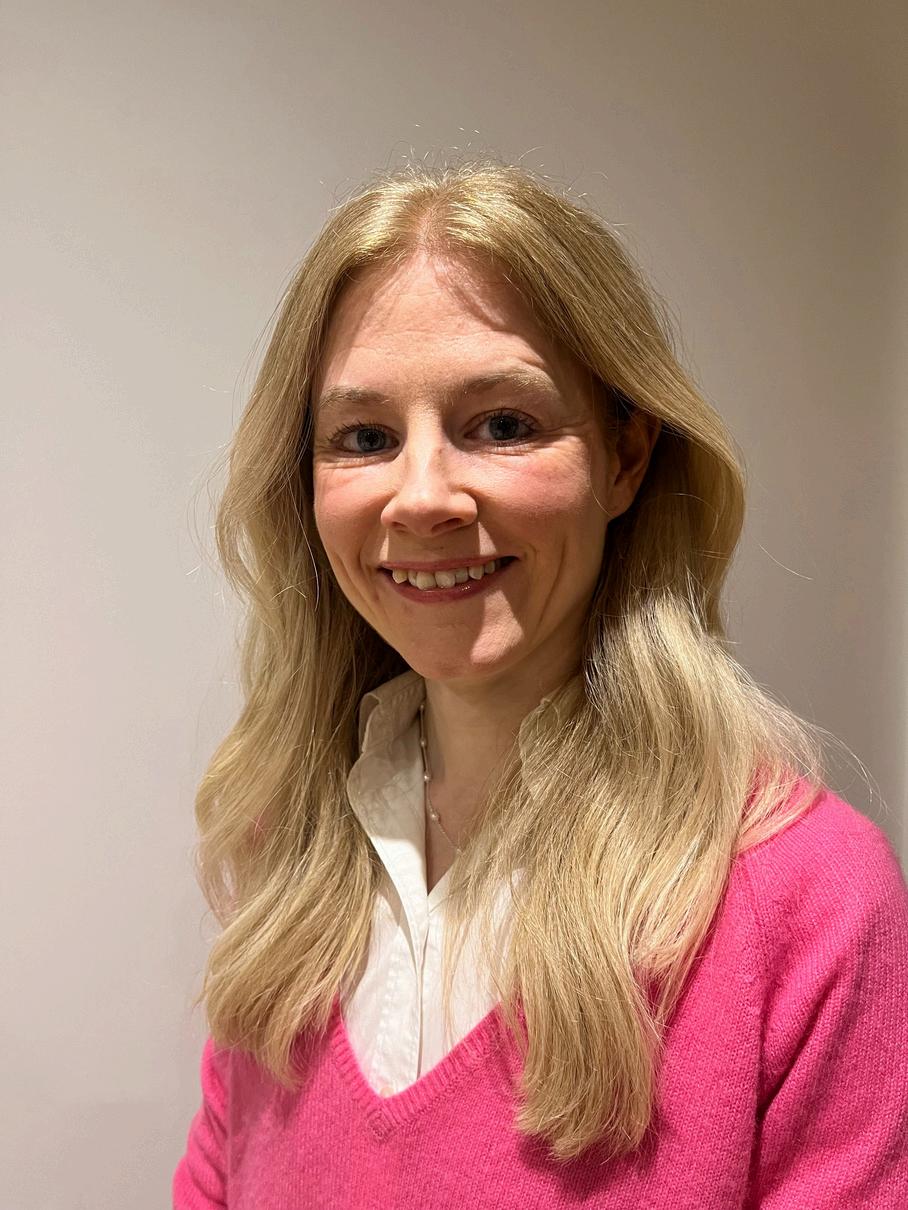
Lead Psychologist for Children’s Community Psychology, Lambeth and Southwark Community Paediatrics Service
Freya completed her undergraduate psychology degree, followed by a PhD in Cognitive Neuroscience at Newcastle University.
After working as an assistant psychologist in the
paediatric oncology unit at the Great North East Children’s Hospital, she completed her Doctorate in Clinical Psychology at Teesside University. Since qualifying as a clinical psychologist, Freya moved to London and has spent her post-qualification career working with children and young people with neurodevelopmental conditions as well as those with physical disabilities, first at the Tavistock and Portman, in the Neurodevelopmental and Complex Feeding teams at the Evelina London Children’s Hospital, and now leading the new Children’s Community Psychology team within the Community Paediatrics service at the Evelina.
The Children in Care health team in Cornwall conducted a small test of change involving administering the catch-up immunisation programme to UASC within their statutory health assessments. Local audits indicated these young people were not getting their immunisations with their GPs, as recommended at the initial health assessment (IHA), and some were leaving care without being immunised Many potential barriers to this were explored, including language complications and communication, uncertainty/poor mental health, and a lack of young people's understanding of what is required and why.
Offering the catch-up immunisation schedule to UASC was an addition to the “one-stop shop” model already established, which enables necessary screening and timely treatment. The project successfully achieved the catch-up schedule for most young people in the pilot groups and commenced the schedule for others. The project demonstrated the potential of improving health outcomes for UASC by providing immunisations and offering a culturally informed and sensitive service that identified and supported their health needs.

Trainee Advanced Nurse Practitioner, Children in Care, Royal Cornwall Hospital NHS Trust
Katie qualified as an adult nurse in Nottingham and started her nursing career within the acute fields of haematology and intensive care before specialising in public health. She worked as
a School Nurse in Nottingham and Cornwall and became a Specialist Children in Care Nurse in October 2012. During the COVID-19 pandemic, Katie valued the opportunity to deliver and support the COVID-19 vaccination programme.
Named Nurse for Looked After Children, Royal Cornwall Hospital NHS Trust
Since leading the Specialist Children in Care Nurse team in Cornwall, Lydia has overseen a period of change, not least of all the COVID-19 pandemic. It has been necessary to develop a new way of delivering the service, in recognition of increased numbers of looked after children
and static workforce numbers. She has participated in the JTAI inspection with a theme of inter-familial CSA. Lydia initiated the development of an ACP role within the Children in Care health team, and successfully negotiated the formation of the role within Community Paediatrics, supporting one of her team to undergo the training. Within Cornwall, Lydia is an active member of the Corporate Parenting Managers Partnership, sits on the Better Homes Panel, is a Governor for the Virtual School, and was a COVID-19 vaccinator during the pandemic.
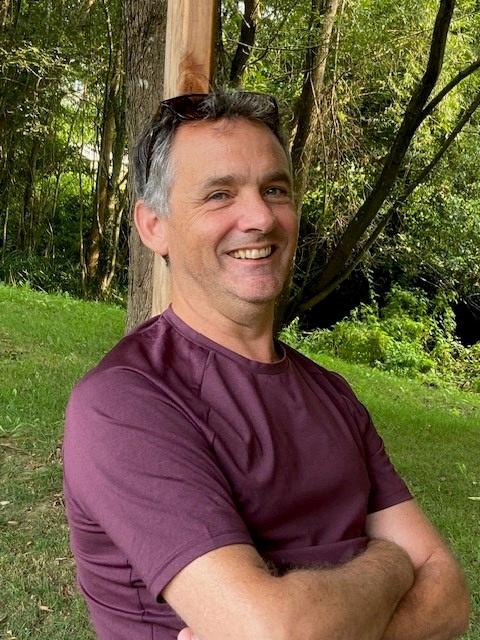
Russell was adopted in the 1960s as a baby. This has led him to have an ongoing interest in adoption throughout his life, both professionally and personally Russell qualified as a doctor in 1993. Since 2000, he has worked in Bristol and South
Gloucestershire at the Children’s Hospital and then for the community team. Around 2010, he entered the adoption arena as an applicant and he has adopted two children. From 2015-2020 (approx.) he sat on CCS Panel as an independent member. He currently works as a community paediatrician, primarily working with Children in Care and Unaccompanied Children Seeking Asylum, and as a Medical Adviser for Adoption in Cornwall He also remains as Designated Doctor for Children in Care in Wiltshire. He is a member of the CoramBAAF Health Advisory Committee. In his spare time, Russell enjoys acting, circus, trapeze and pilates.

The afternoon panel will be an opportunity for our members and delegates to put their questions to a panel of experts by experience and hear their vision for more equitable, diverse and inclusive health services
'A
This session offers a valuable opportunity for our members and delegates to put their questions directly to a panel of experts by experience. The panel consists of individuals who bring powerful insights drawn from their own lived experiences within the health and care system. Through open conversation and thoughtful dialogue, the panel will share their perspectives and aspirations for creating more equitable, diverse and inclusive health services. It’s a chance to listen, learn and be inspired by the voices at the heart of meaningful change

Facilitator, Independent
Anthony Lynch (he/him) is a facilitator working in the youth voice, adoption and mental health space. He has worked with Coram, Adoption UK and the CVAA to incorporate
individuals with lived experience into their organisational structure As part of Coram's Youth Insight Group, he produced an intersectional research paper highlighting the experience of individuals with multiple identities in a single social category, as well as hosting Adoption UK's first ever in-person events for adult adoptees. Currently, Anthony is leading several digital workshops for young adopted people, as part of a Parliamentary Inquiry by the All-Party Parliamentary Group on Adoption and Permanence. Outside of adoption, he works as a Youth Voice Manager at The Mix/Mental Health Innovations
Postgraduate student in International Relations, care leaver and volunteer with Coram Voice

Susan is currently a post-graduate student studying international relations and a volunteer with Coram Voice. As a disabled woman and care leaver, she is passionate about improving the experiences of children in care and care leavers with disabilities.

Salma is a care experienced changemaker and member of both the Drive Forward Policy Forum and the Pan London Children in Care Council
She works as a Museum Assistant at the Foundling Museum, supporting the Tracing Our Tales art traineeship for care experienced young people. Salma is passionate about policy reform and improving access to mental health services for care leavers and minority communities. She has spoken at the Become APPG in Parliament and contributed to Collaborate for Change at City Hall, where she shared her lived experience through verbatim performance. Salma continues to advocate for better policy and mental health support by using her voice and lived experience to push for meaningful change.

Ikra is an expert by experience, who holds roles in Barnet Council and volunteers with Drive Forward Foundation as a member of their youth-led Policy Forum, where she is an ambassador for the charity.
Ikra is also an ambassador for the youth homelessness charity Centrepoint. Alongside their advocacy work, she studies Law with Arabic at Sussex University. Ikra aspires to be a human rights lawyer and hopes to achieve reform in the care leavers sector, with the ultimate aim to advance their profession, contribute to policy reform for disadvantaged groups and extend their career into Middle East conflict resolution.

Drive Forward facilitates a Policy Forum of care experienced campaigners who use their lived experience to fight for change so that future children in care and care leavers get a better deal. Their mission is to bridge the disconnect between care experienced young people and policy makers in order to achieve effective change and equality of opportunity for care leavers.
Drive Forward Foundation Policy Forum

Authors
Hedy Cleaver and Wendy Rose
Price
£24.95

Listen to the author interview on our website!
For most children and young people who cannot remain living safely at home, foster care, kinship care, adoption and special guardianship provide safe and caring families However, for a few this is not the case – children can and do experience sexual abuse while in care.
This is the first study to focus on children who were sexually abused by members of the household or family friends while living with foster carers, kinship carers, special guardians or adopters
It examines and analyses safeguarding reviews involving 87 children conducted between 2007 and 2022 and identifies what happened and why. The findings, including hasty assessments, demanding court timescales, children’s fear of disclosure, and not taking into account historical allegations, are explored to encourage practitioners to reflect on agency safeguarding practice and their work with children who are sexually abused.

This guide is designed to make the knowledge from the Good Practice Guide more readily accessible to those in practice. It poses a series of questions for professionals to encourage reflection and practical action, to help maximise opportunities to ensure that children are safe.

Workshops are an opportunity for delegates to break into smaller groups to reflect and learn together Workshops will begin at 12 30pm, and then repeat at 2.15pm.
We will run our workshops twice, once before and once after lunch. The below table indicates the workshops and their assigned letters which will correspond to the letters on your name badge. The first letter indicates your first workshop; the second letter indicates your second workshop.
Workshops 1 and 2 will be held at the Foundling Museum (located near the front entrance of the Coram building) Workshops 1, 2 or 3, assemble outside the foyer of the conference venue where a member of the team will escort you to your workshop room. (See map on final page).

Consultant Community Paediatrician, University College Hospital
This 45-minute workshop will focus on learning from both frontline clinical work and emerging research involving CYPSAR (children and young people seeking asylum) to explore how can we deliver services that are inclusive, trauma informed and driven by the voices of young people themselves.

Dr Allison Ward is an NHS Consultant Community Paediatrician specialising in the health and wellbeing of vulnerable children. She works across three central London NHS Foundation Trusts (The Royal Free London, CNWL and University College London Hospitals) and has been a named doctor for safeguarding and children looked after in Camden since 2015 She has worked in the NHS for 20 years, and her current clinical work involves the holistic health assessment of separated children (also known as unaccompanied asylum-seeking children) in a weekly dedicated paediatric clinic for children in care.
Dr Ward is founder/lead of the NCL (North Central London) integrated health network for unaccompanied asylum-seeking children, and co-founder/lead of the UCLH RESPOND Integrated Refugee Health Service. She is Chair of the UCLH RESPOND Complex Refugee Health Advice and Guidance Panel and has delivered multi-agency training in safeguarding children and refugee health at ISPCAN, The London School of Paediatrics, UCL and LSHTM. Dr Ward is a member of the Royal College of Paediatrics and a co-founder/lead of their “How to Manage: Refugee and asylum-seeking children and young people” course.

Independent Consultant and Associate Trainer, CoramBAAF

Fostering Consultant, CoramBAAF
This 45-minute workshop explores the critical role language plays in shaping perceptions, experiences and outcomes for care experienced children and young people. It offers practical guidance to writing with empathy, and accuracy while also supporting care experienced children’s lifelong identity needs
About Emma Fincham
Emma started working at CoramBAAF in October 2021. She is a qualified social worker, with over 25 years of experience in children and young people’s services. She most recently led a fostering team in Brighton and Hove City Council for five years.
Emma led on step down placements, for children and young people moving from a residential setting back to living with a foster family. Emma has also worked in child protection, on establishing the young carers project in Tower Hamlets, co-ordinating the Summer University for young people in Brent, and on a service redesign for local authority and voluntary youth services in Brighton and Hove.
About Mandeep Sahejpal
Mandeep works as an Independent Social Work Consultant. She has extensive experience of working in fostering, adoption and children and family services. Mandeep has worked alongside carers and prospective adopters, from the pre-approval stage through to assessment and post-approval. She also investigates complaints on behalf of local authorities and independent fostering agencies.
Mandeep has chaired fostering and adoption panels, carried out the role as the agency decision-maker In addition, she chairs complex foster carer reviews and supports fostering and adoption agencies to prepare for inspections and service improvement.

Designated Doctor Looked After Children, Leicester, Leicestershire and Rutland
Designated Doctor Looked After Children, Nottinghamshire, and RCPCH Assistant Officer for Child Protection

In this workshop we will be exploring how principles of equality, diversity and inclusion are essential to delivering high quality initial health assessments for care experienced children and young people. We will explore practical ways to embed EDI principles into the IHA process to ensure that assessments are person-centred and responsive to the diverse needs of children in care.
Vicki is a Consultant Paediatrician in Mansfield and the Designated Doctor for Looked After Children in Nottinghamshire She was the RCPCH representative for looked after children between 2019 and 2022, sitting on the Child Protection Standing Committee and working with the College to support paediatricians, progress training and improve health outcomes for looked after children. She continues to work at a national level as RCPCH Assistant Officer for Child Protection, with responsibly for RCPCH safeguarding courses, clinical editor of eLfH Level Three safeguarding children training, and as the Midlands looked after children rep for the NNDHP.
Dr Lynn Snow is a community paediatrician working as Designated Doctor for looked after children for Leicester, Leicestershire and Rutland She has worked with looked after children for over 20 years in various roles (including adoption medical adviser) in various areas of the country. She is currently the RCPCH Looked After Children’s Representative championing Our Children in the work of the College in training of paediatricians and policy, and has just completed a Churchill Fellowship researching Post-Adoption Depression. She was previously Chair of the CoramBAAF National Health Advisory Committee and has focused on health records for children postadoption working with DHSC and NHSE.

Augusta Itua Legal Consultant, CoramBAAF
Access to personal health records can help care experienced young people make sense of their journey and identity This workshop will explore the legal, ethical and practical considerations involved in supporting access to health files. It will discuss common challenges and how professionals can navigate this complex area while keeping the child’s best interests at the centre.
Augusta qualified as a solicitor in 2020 and has extensive experience in youth justice, community care, education and strategic litigation. Before joining CoramBAAF, she worked as a Youth Justice Lawyer and Policy Officer at Just for Kids Law. She also served as Head of the Children’s Rights Advice Service at Article 39. In 2023, Augusta was awarded a Churchill Fellowship, to research supported access to children’s social care files. In 2024, she became the Chair of the Racial Justice Family Network, a collaborative initiative promoting anti-racist practice in the family justice system.
Recommended resources
Access to records (webpage)
Adoption records (webpage)
Children’s social care files (webpage)


You will find our poster presenters in the Dickens Room, located in the corner of the ‘Forum’/ refreshments area (between the Wilson Room and the toilets).
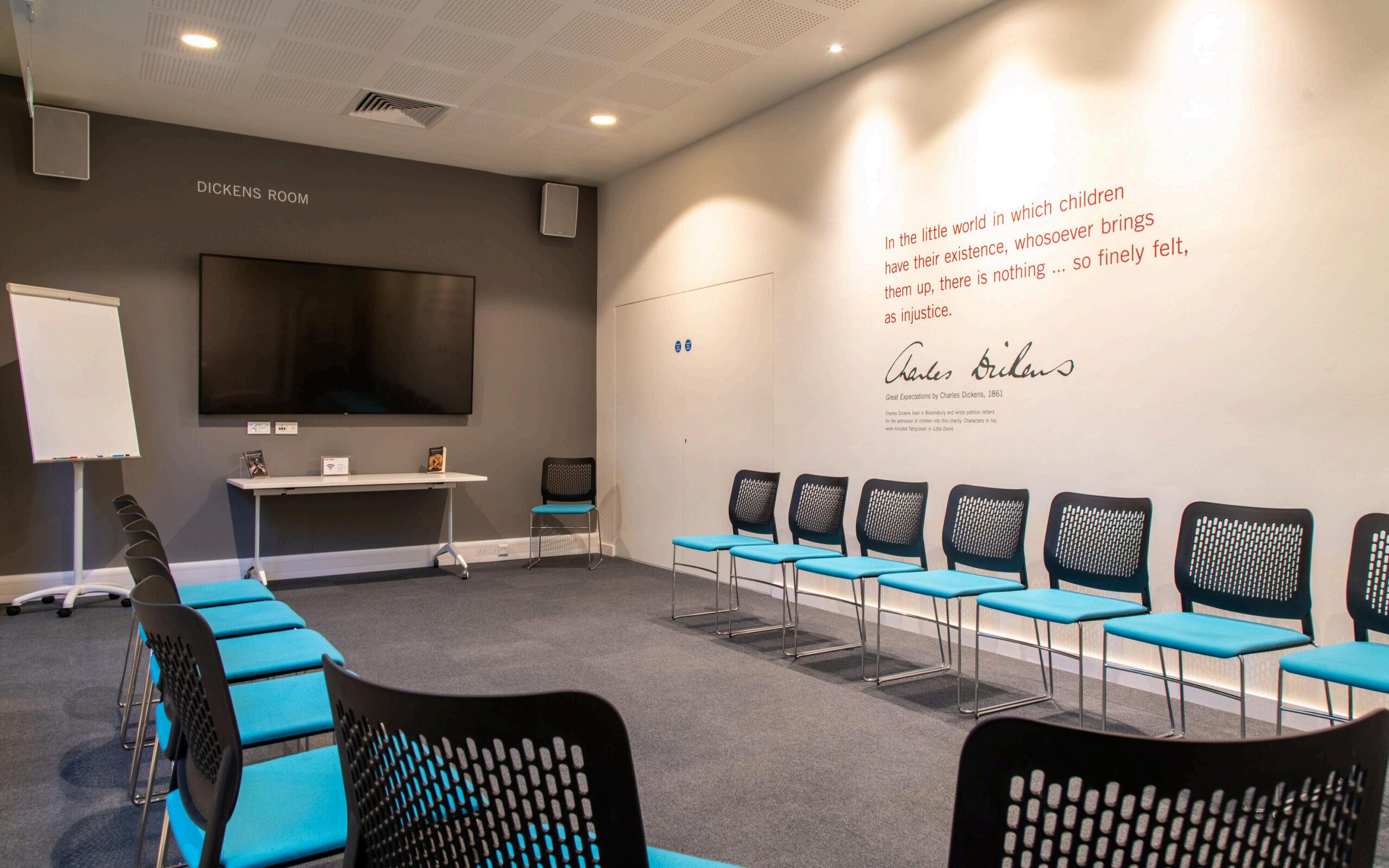
Emma has worked with Coram Voice for 12 years in a role that involves some direct work with disabled young people who are in receipt of social care support, including looked after children and care leavers.
In addition, she leads on Coram Voice’s specialist disability projects and training, as well as supporting other advocates within and outside of Coram Voice, to advocate effectively for young people with disabilities.
In 2022, the NHS England and NHS Improvement Southeast Looked After Children and Care Leavers Deep Dive identified a need to measure the impact of health interventions to help close the gap between children in care and the wider population. The Brighton and Hove Children in Care Team developed a pilot health outcome tool in Oral Health.
Visit Dr Sam Williams and Specialist Nurse Jane Payne to find out more about this exciting pilot.

Come and talk to us to find out more about how we aim to improve the standards of health practice, service provision, and training for health professionals in adoption, fostering and child care practice.
CoramBAAF are the UK’s leading membership organisation for professionals working across adoption, fostering and kinship care. We provide information, best practice guidance, advice, training and resources to support our members and influence policy to improve outcomes for children and young people.
Our corporate members in England, Wales, Scotland and Northern Ireland represent 94% of all local authorities as well as regional adoption agencies, health and social care trusts, independent fostering providers and voluntary adoption agencies, and cover 88% of all children and family social workers.
Our 650+ individual and associate members - comprising lawyers, health professionals, educational institutions, therapeutic and family support services, and more - reflect the multidisciplinary nature of our work
Together, our members make up the largest network of organisations and individuals involved with children in their journey through the care system.
We are a publisher
We provide the largest selection of books for social workers and children’s social care professionals Our comprehensive range of publications offer up to date practice guidance and advice. We also publish the only quarterly peer-reviewed journal dedicated to adoption and fostering issues,
Adoption & Fostering Journal.
We are a training provider

We are an advice and information service
Our Advice Line service responds to over 200 queries every month We provide expert practice advice, with input from our team of specialist consultants, to support the work of our members. Our information service keeps our members up to date with the latest news and developments. The monthly CoramBAAF Digest gathers together information on UK legislation, policy, research, statistics and online resources for those working in adoption, fostering, kinship and child welfare
We are Coram
We are part of the Coram Group. Our work enables us to better understand what works for children and young people, and communicate with those in a position to make a real difference We use our insight and experience to engage with government, local authorities, social workers, teachers, carers and families to help deliver better practice, systems and laws.


94% of local authorities are members, is yours?
Take advantage of your organisation's membership by creating a personal website account. This will grant you free access to a range of membership benefits, including webinar recordings, access to our journal, and much more.